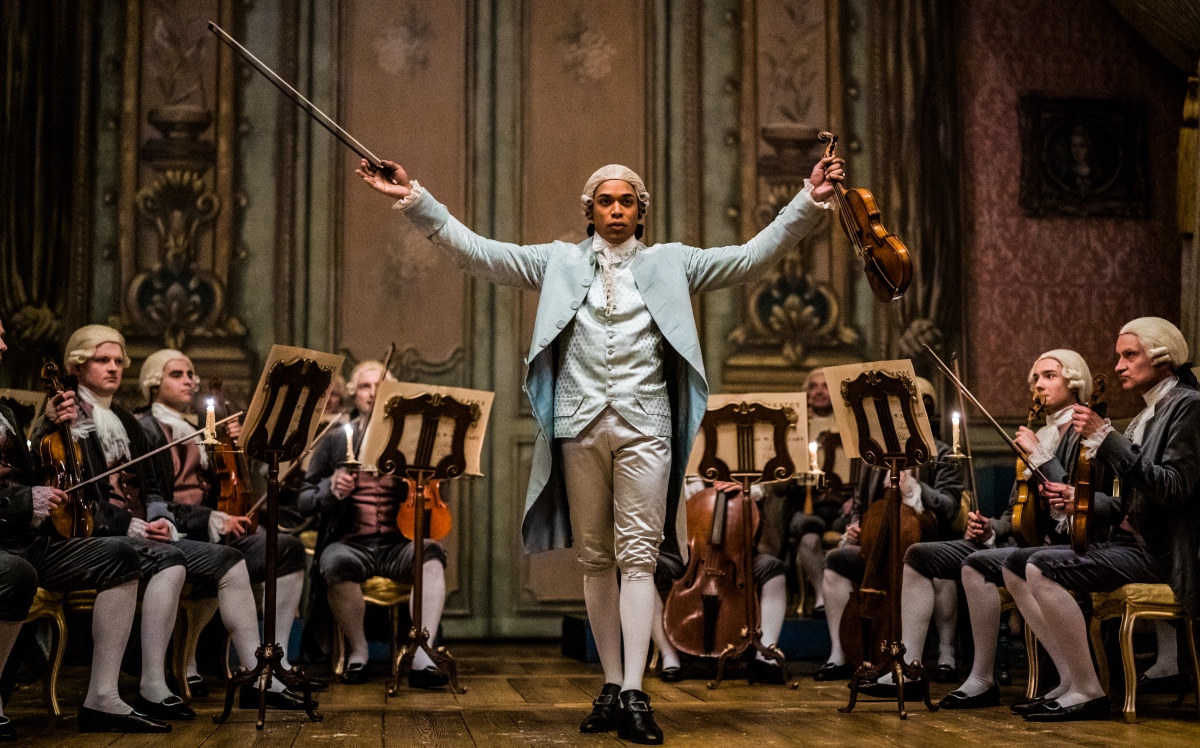From Immortal Beloved to Tick, Tick… Boom! Hollywood loves films about the tumultuous personal lives of composers, and the latest stab at exploring the history of a prodigal musician is Stephen Williams’ Chevalier. More period romance than historical biography, Chevalier’s grandiose costumes and Shakespearian characters make for a dazzling visual spectacle and a unique approach to French Revolution-era drama conventions. Though the film seems frustratingly uninterested in an in-depth exploration of the titular character’s upbringing or personal internal conflicts regarding his status as a racial outsider among the French elite, Chevalier is still a thrilling chronicle of an incredible man’s previously untold story.
Starring Kelvin Harrison Jr., Samara Weaving, and Lucy Boynton, Chevalier follows the miraculous journey of Joseph Bologne, the son of a French plantation owner and an African slave. As a child, Joseph shows astonishing musical aptitude, which secures him a spot at a prestigious French boarding school, despite the fact that Black students aren’t welcome. As the years progress, Joseph’s talent flourishes in spite of constant racism, and he ends up being bestowed the title of “Chevalier” (French knighthood) by Marie Antoinette on the eve of the French Revolution. But when his competitive spirit has him vying for a spot as the head of the Paris Opera, he begins a torrid romance with soprano Marie-Josephine (Weaving), despite the fact that she’s married to Antoinette’s warmongering military engineer.
Certainly, Chevalier addresses the push and pull of the life of a Black composer/violinist who’s constantly reconciling his role in high status French society and his identity as a Black man—especially when Joseph’s mother arrives in Paris and begins to live with him and we get a few brilliant scenes of Joseph struggling to understand her. But for every precious gem that is a scene like that, there are nearly 4 times that many chronicling his at-times soapy romance with with coy ingenue Marie-Josephine.
It’s not that the romance is uninteresting. Samara Weaving is frequently underutilized as a romantic lead, and it’s gratifying to see her given something to work with here. Opposite Kelvin Harrison Jr., she makes for a sparkling romantic lead—it’s difficult to picture a woman who could so fascinate a personality and a talent like the bombastic Joseph Bologne. They make a formidable pair and have plenty of bodice-ripping chemistry. But at the same time, it’s strange that a story with so much depth and nuance would opt to invent a romance as opposed to take its notes from the narrative of his actual (no less tumultuous) life. Still, it’s the romance we got, and it’s the romance that functions as the emotional core of the film. Harrison and Weaving have a distinctly modern chemistry about them—this feels closer to Romeo + Juliet than Amadeus.
Still, the first hour of the film does devote a solid chunk of time to exploring Bologne’s youth and upbringing—though it begins in Paris, not where he was born, and a montage speeds through his formative years. Of course, there are scenes that feature Joseph navigating clashes with other students at the boarding school—one particularly memorable sequence includes him fencing in front of Marie Antoinette, the feat that earns him the eponymous title of “Chevalier.” But they’re the cartoonishly evil, conventional portraits of racism, and don’t do much in the way of exploring how the constant assaults impacted Joseph as a young man. We only see the aftermath.
Still, the film’s strange choices about what to show and what to omit from the many twists and turns of Bologne’s life don’t stop Chevalier from being a wholly gripping tale of love, loss, passion, and identity. In addition to Harrison’s leading turn and Weaving as an old Hollywood-style love interest, it’s Ronke Adekoluejo as Bologne’s mother Nanon who gives the film some of its most affecting moments, and provides Harrison with the best dramatic sparring partner. Though it may not be the weighty biography Bologne deserves, Chevalier is still an undoubtedly effective period romantic drama.
(featured image: Searchlight)









Published: Apr 17, 2023 11:50 am